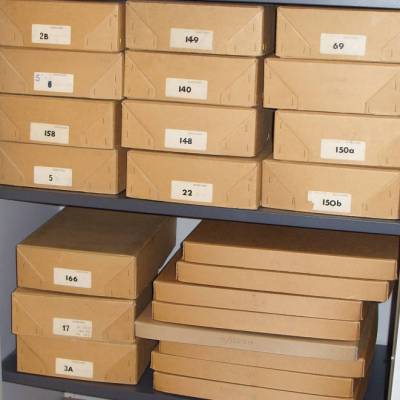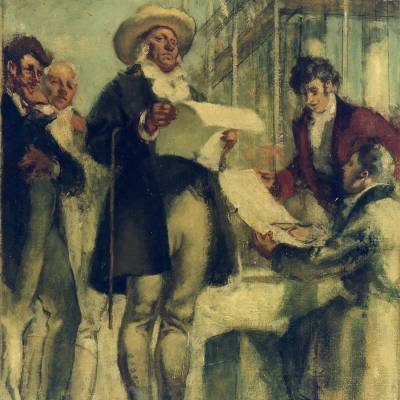Bentham and UCL

The vast collection of manuscripts written and composed by Bentham, held by UCL Library Special Collections, are of outstanding international historical and philosophical importance, and are one of UCL's most important possessions. The papers were originally given to Bentham's literary executor John Bowring (1792-1872), who produced a generally derided eleven volume edition of Bentham's works between 1838 and 1843.
Bowring handed over the manuscripts to the then London University (later UCL) before he departed London in 1849 to assume the position of British Consul at Canton (modern-day Guangzhou). The British Library holds a further 12,500 of Bentham's papers, mostly consisting of correspondence to and from Bentham and his family, and which were left to his nephew, the renowned botanist George Bentham (1800-84).
During 2012, the British Library joined the Transcribe Bentham initiative, and that institution's Bentham Papers have been digitised and will be added to UCL's digital repository, thereby uniting the manuscripts (at least digitally) for the first time since Bentham's death.
There are around 100,000 manuscript pages, most of which are held by UCL Library, and the remainder are at the British Library.
In addition, according to his final will, dated 30 May 1832, Bentham left to relatives, friends, and employees, twenty-six mourning rings made by John Field in 1822. The rings are made of gold, and consist of a painted silhouette, and a locket compartment containing Bentham's hair.
One of these rings - which belonged to Bentham's literary executor, John Bowring (1792-1872) - is displayed alongside Bentham's auto-icon.
UCL owns three more of Bentham's rings: the first was bought at auction by Professor Philip Schofield, the present director of the Bentham Project, and was given to William Tait (1793-1864), the Edinburgh publisher and bookseller, who had published the edition of Bentham's works prepared by Bowring; the second was donated to UCL by Mr Denis Roy Bentham and belonged to Jean-Sylvain van der Meyer (1802-74); and the third belong to the other great utilitarian philosopher, John Stuart Mill (1806-73), donated to UCL by Mr Michael Phillips, an alumnus of the Faculty of Laws, who purchased the ring ina jeweller's in New Orleans.
Another ring is in the possession of descendants of one of Bentham's servants, leaving twenty-two things currently unaccounted for.

Image credit: College Art Collections, UCL
Henry Tonks's (1862-1937) Sketch for the Founders of University College was painted in 1922, a tempera study for the mural in the dome of the Flaxman Gallery, in commemoration of the centenary of UCL, and is located in the College's Main Library.
It shows the principal figures associated with the founding of UCL: the architect William Wilkins (1788-1839), the poet Thomas Campbell (1777-1844); the lawyer and politician Henry Brougham (1778-1868); and the diarist Henry Crabb Robinson (1775-1867). Bentham is shown being presented by Wilkins architectural plans for the College, which he never did (and nor did he meet Wilkins).
The mural has helped to sustain the myth that Bentham was a founder of University College, though he did subscribe the not inconsiderable sum of £100 to its foundation. Bentham does, however, deserve to be considered as the spiritual father of UCL: many of its founders held Bentham in great esteem, and their project embodied many of his ideas on education and society. Bentham strongly believed that education should be widely available regardless of race, creed, or political belief. UCL went a long way to fulfilling Bentham's vision of what a university should be.
You can view Tonks' finished mural in the Flaxman Gallery (accessible through the UCL Main Library, Wilkins Buildings, find out the opening times here.
 Close
Close


